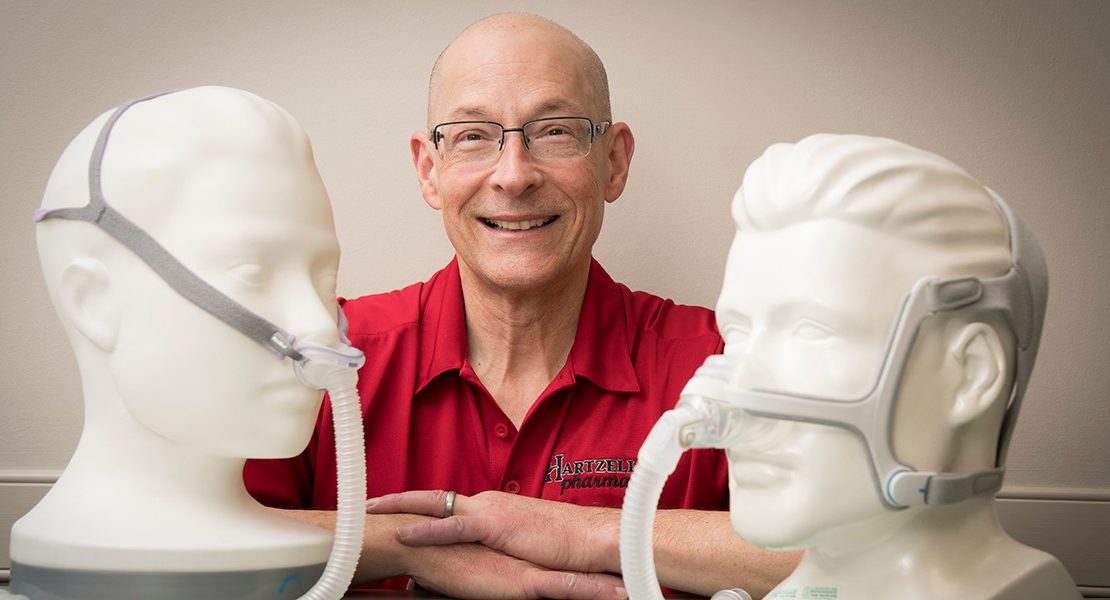Always Tired? Maybe It’s Sleep Apnea

During a routine checkup in 2015, Jeanette Dauphin mentioned to her physician she was always tired. Because of the exhaustion, she sometimes had difficulty focusing during the day and rarely had the energy to stick with an exercise routine. Jeanette never questioned why she felt this way, chalking it up to her myriad responsibilities.
“Women are just used to being tired. We live that way,” she says.
A sleep study was scheduled and to Jeanette’s surprise, her results came back positive for obstructive sleep apnea (OSA). People with this disorder stop breathing periodically through the night when they’re supposed to rest and recharge. Cessations in breathing force the brain out of deep stages of sleep so it can trigger the body to breathe again. This process continues through the night, in some cases hundreds of times. Though Jeanette and others typically aren’t awoken fully, the pull from sleep over and over is enough to guarantee lousy slumbers and rough mornings.
Jeanette, an employee at Hartzell’s Pharmacy in Catasauqua, knew exactly who to talk to about reintroducing quality sleep into her life: Ron Cherewaty, her colleague. Ron’s professional title is registered respiratory therapist; his unofficial title, though, is sleep guru. Ron is an expert on obstructive sleep apnea and finds the best treatment for patients like Jeanette.
Ron explains OSA develops for several reasons, but it is most commonly a result of being middle aged or older and overweight. As we age, we lose muscle tone. This, coupled with excess body weight, contributes to muscle and fat pads in the neck and throat no longer having support, explains Ron. Relaxed muscles and fat are pulled by gravity and block the airway during sleep.
Signs of OSA include snoring, dry mouth, flailing, witnessed apneas, and snorting. Symptoms include extreme daytime sleepiness, morning headaches, nocturnal sweating, high blood pressure, and high blood sugar. Ron says the presence of two to three symptoms that affect daily function should elicit a discussion with your physician. If he or she determines OSA could be the culprit, a referral is given to see Ron, who will counsel the patient on the best form of therapy.
The first step to treatment is to order a home test. The unit is received by the patient and set up, as the name suggests, at home. This allows people to sleep in the comfort of their own beds rather than plan overnight visits in a lab. Ron explains the device measures air flow out of the nose and mouth; has a speaker to measure the decibel level of snoring; uses a finger probe to quantify blood-oxygen saturation levels; and is outfitted with a belt to measure the rise and fall of your chest.
After sleeping with the unit for one to three nights, the data is analyzed by a board-certified sleep physician. If all signs point toward OSA, Ron gets to work fitting his patients with a continuous positive airway pressure device. To answer the question that just occurred to everyone: yes. This is a machine you are connected to via face mask. Ron assures it isn’t nearly as obtrusive as we imagine.
“Patients on night one may fall asleep with the mask on and wake up hours later, having slept an entire night,” says Ron. “If that doesn’t happen, it’s not a big deal. Other people will experience waking up a couple hours later. If they can’t fall back asleep easily, take off the mask and start again the next night.”
The CPAP devices use air in your bedroom and pressurize it before passing through the mask and into your airway. Constant air flow means throat obstructions are kept out of the way, and you can breathe easily all night. The machines even filter out impurities in the air and come with a small built-in humidifier for those who live in dry climates.
As your body regains oxygen, these negative long-term consequences from untreated OSA diminish: high blood pressure, heart disease, risk of stroke, pre-diabetes and diabetes, and depression. In addition to these benefits, Ron says there’s another bright side—your partner is happy. “I’ll get a phone call from a spouse saying, ‘Thank you! I can sleep again and don’t hear that loud snoring,’” he says.
Most patients report snoring that disrupts their partners, often forcing the couple to sleep in separate rooms, which can be stressful for the relationship. For those worried about the noise a CPAP emits, Ron says the sound is minimal and newer machines are so quiet that for those who share a king-sized bed, the partner likely won’t even hear it.
Ron’s patient and colleague, Jeanette, has noticed an energy surge since committing to her CPAP therapy. She sleeps better, isn’t as drowsy during the day, and her overall health has improved. Jeanette now pounds the pavement throughout the week, sometimes walking three miles at a time. Her CPAP machine even helps alleviate sinus issues.
“People are not familiar with this medical community,” Jeanette says. “If you’re feeling tired, you should reach out to your doctor for tests. I don’t know that most people would consider that it would be sleep apnea.”
Ron is determined to normalize the discussion of sleep apnea and hosts periodic educational talks at Hartzell’s. His next event, open to the public, will be Wednesday, June 21 from 6 p.m. to 7:30 p.m. If you can’t make the seminar, Ron is always happy to speak with you one on one.
Hartzell’s Pharmacy
300 American St, Catasauqua
610.264.5471
hartzells.com












